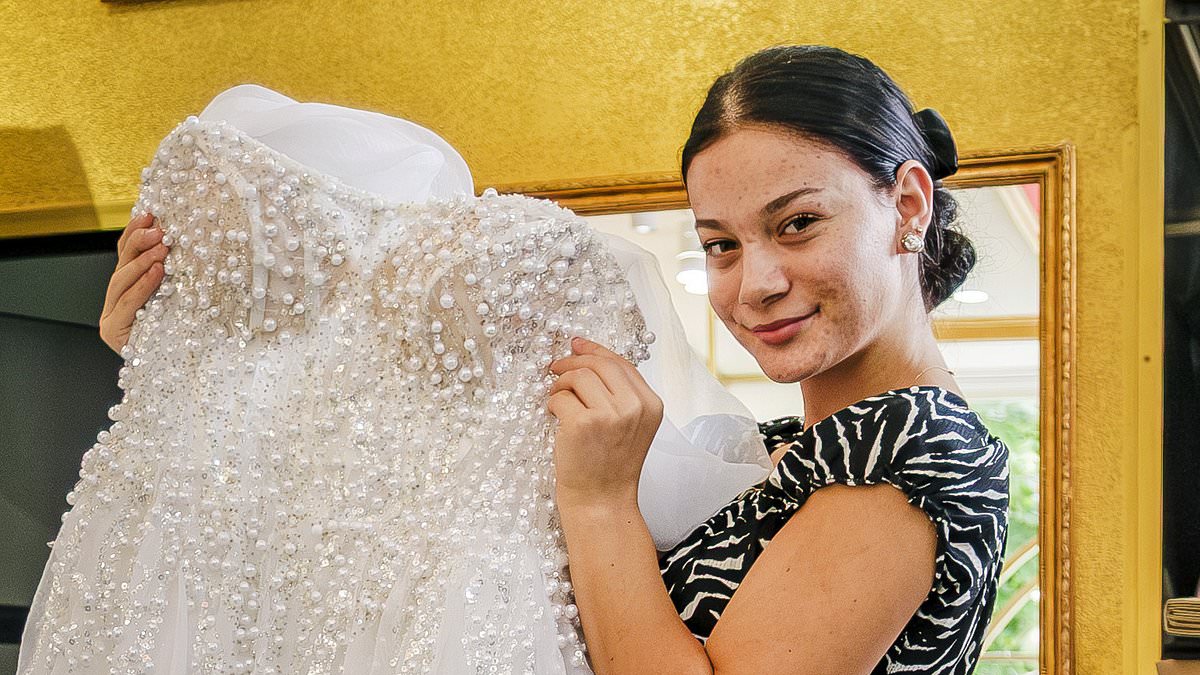In the quiet Albanian town of Has, nestled in the mountains a few hours north of Tirana, something’s missing—and it’s not hard to notice.
The streets feel oddly lopsided, the cafés filled with women and girls, but barely a young man in sight.
That’s because many of them are thousands of miles away, working in Britain.
Their absence isn’t just physical—it’s left behind emotional, cultural, and economic holes that women like Besmira are struggling to fill.
Love at a Distance: A Marriage on Pause
Besmira, a former government statistician, spends her days checking her cracked phone for messages from her husband, Arben.
It’s been four long years since she last saw him in person.
At 32, she’s desperate to start a family with the man she loves—but he’s in Manchester, working 12-hour shifts on a construction site, living in a rented room, and sending every spare penny home.
The two met in Has when they were 24, married, and shared four years together before Arben paid smugglers £5,000 to make the dangerous boat crossing from France to Britain.
What was supposed to be a temporary move for better wages has turned into a drawn-out separation with no clear end in sight.
A Town of Women and Waiting
Besmira isn’t alone. She’s just one of many women in Has whose partners have left in search of work.
In this town of only 5,000, the men are disappearing.
In 2022 alone, some 13,000 Albanians—many of them teenagers—illegally crossed into the UK, most believing Britain would offer instant opportunity.
The exodus is so significant that Has now seems to be run by women.
Even the town’s road sweepers, a role traditionally held by men, are now almost exclusively female.
A Tribute to Britain… But at What Cost?
The town’s ties to the UK are worn with pride. Union Jack flags are painted on pubs, Big Ben decorates coffee tables, and a statue of Queen Elizabeth II is even being erected beside the town hall.
But beneath the symbols of British admiration lies a more troubling reality: families stretched thin, marriages strained, and children growing up without their fathers.
Young girls in Has spend their days idling in cafés, their social lives stalled as the boys they might have dated or married are all overseas.
“They don’t need to work,” a local bartender explained, “because their brothers or husbands send them money from England.”
The Emotional Toll of Separation
Besmira is painfully honest about how much she’s struggling. “I’m depressed,” she admits.
“So many women here feel the same way. The men leaving destroys our families.
They forget us, and divorces are rising.”
While money does flow in from abroad, she says, “money isn’t everything.”
She lives with Arben’s parents and uses his wages to help support extended family.
There’s nothing left to help her join him in the UK—especially now that the cost of being smuggled into Britain by truck has soared to £22,000.
A Future Stuck on Hold
The irony isn’t lost on Besmira: her husband works himself into exhaustion to provide for her, yet they’re both missing out on the life they planned together.
“We want children,” she says with tears in her eyes.
“He thought he’d come back, but it’s never the right time.
There’s no work for him here, so he stays.”
Rebuilding Has: One Hopeful Step at a Time
Jahir Cahani, a former teacher turned tourism promoter, hopes to stop the outward flow.
He’s setting up a “tourist village” to create local jobs and, ideally, bring some of the emigrants back.
“There are 300 sunny days a year,” he says. “Tourism is the future.”
But that’s a long-term dream. Right now, Has is in limbo.
Professor Festim Danti, another local, adds that boys are growing up without male role models, and women are carrying far more than their fair share.
“They care for their own parents and now their in-laws too,” he says. “It’s just too much.”
Summer Weddings, Short Reunions
July brings some temporary joy as men who have legal UK status return to marry their long-distance fiancées.
But the celebrations are often bittersweet. Thanks to UK immigration rules, many brides won’t qualify for a visa to join their husbands.
Instead, they’re left behind again after just a few weeks together.
At a local bridal shop, sales assistant Doriana Laci, 19, says most brides-to-be come in alone or with friends.
“The boys are all gone. It’s hard to even meet someone, let alone fall in love.”
When Love Competes With Survival
Some men do manage to build new lives in the UK—sometimes too new.
There are whispered stories of men who remarry without divorcing their Albanian wives, disappearing into a second life abroad.
Besmira has thought of smuggling herself to Britain, but it’s simply out of reach financially.
Despite it all, she insists she and Arben still love each other deeply.
“We talk on the phone whenever he’s not working. But this isn’t a real marriage anymore, is it?”
A Glimmer of Hope in a Changing Landscape
Not everyone has given up on Albania. Edmir, a young man who was deported from the UK in 2022 after nine years working off the books, recognized the reporter in Has this week.
Back then, he was heartbroken about returning home with no job or future.
But now? He’s married, about to become a father, and cautiously optimistic.
“We’ll be a real family,” he says. “I do miss the money, though.”
Living Life Second-Hand
As for Besmira, she left her job at the town hall after her mental health declined.
Her days revolve around chores, family duties, and waiting. Always waiting.
“I feel like I’m living life second-hand,” she says softly. “We want a baby, a future.
But phone calls for four years… that’s not really a marriage, is it?”
And really, how many women in Has are quietly asking themselves the very same question?
